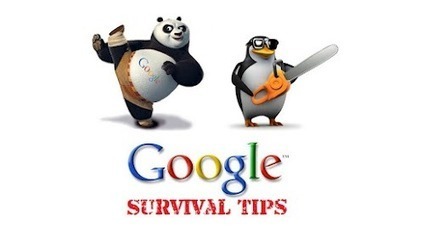It’s only been a few short weeks since Google dropped the Penguin on search. Funnily enough, many of the ones squealing were the same people who ignored the warnings:
STOP THE SPAM.
Before you start thinking, “No big deal. I escaped this one,” you need to understand that the recent additions of Panda and Penguin will be coming around for a visit again, and again, and again. These algorithm changes aren’t temporary, but they aren’t constant, either. They crawl through the index, get a data refresh, and then crawl through again. Like the Terminator, they will be back.
I Hate Google…
The cries are going out. Business owners of tanked sites are disavowing any use of Google. They lost hard and, according to them, were punished unfairly. One commentator that we came across had it right when they said, “Google is an unstable business model.” The company has become one of the biggest scapegoats for downed online businesses.
A few things to remember before we go deeper into this article:
- Google is in business for Google. They aren’t here to make sure your business succeeds.
- Organic search results provide the world’s biggest free advertising; Google is the world’s biggest free advertiser with a local, national and international reach.
- The search algorithms are programs. They have no animosity and aren’t out to get you. They’re only as good as they were programmed to be.
Save the hate. Google is a highly viable marketing tool with (potentially) strong returns, but it’s still just a tool.
Lazy Much?
If they were honest, a lot of companies that lost out would have to admit they’ve been lazy. Article spinning comes to mind, along with blog comment links, blog spam, email spam, and more crap than you’d find in a septic tank. When you can get indexed and rank by throwing links at your site from high-traffic porn sites… well, why do any more? Just throw a link at it.
This, to us, sounds like trying to plug the hole in the Titanic with the iceberg it hit.
Paid links have been much in the news lately, at least if you read the news we read. You’ll hear a lot about companies being yanked out of the SERPs because their SEO provider bought some links. This is an especially dangerous activity, now, and not only for the company benefiting from the links.
May 24th, for the first time ever, Google deindexed an SEO agency for creating paid links to their client’s site (comments are also interesting) rather than trying to build organic ones. In lieu of this action, how willing are you going to be, or anyone in general for that matter, to be lazy?
Good Business is Good Quality
If you went to visit a lawyer and found them in a dusty, dingy, basement office, surrounded by filing cabinets, papers and ashtrays, would you want to hire them? Or, would you feel better about it if you walked into a nice, clean office? We’re betting you’d choose the second option.
Because we assume that good quality begets good quality.
Also, consider that the algo updates rolled out to combat low quality sites and webspam. Why then, would you push a whole bunch of low quality pages and spam out from your site in terms of marketing efforts?
Combating the Panda: Quality On Page
Panda (as well as the layout update that targeted pages with a high amount of ads above the fold) targeted low quality pages. April 17th, the update got a data refresh, which caused some sites to see a dive. Rather than waiting with baited breath to see if it’s going to happen to your site next time around, isn’t it about time you started making your site Panda proof?
How do you survive in a post-Panda world?
Become the preferred link.
Sounds easier said than done, right? However, that’s what it all adds up to: becoming the preferred link, the preferred site, the preferred resource. It’s a never-ending fight with the competition, where the winners are the ones focusing on “amazing, compelling sites“:
- Create great content, not crap copy. Make it readable; make it enjoyable. Oh, and it helps if it induces people to share it!
- Make your search snippets marketable. We’ve written extensively on the importance of marketable search snippets; meta data and titles are for users!
- Make your search snippets rich with the proper markup.
- Work on your social metrics and marketing; actively connect with industry leaders. Become a trusted community resource.
- Make your pages easy to scan before reading by using semantic page structure such as headings, helpful images and bullet points.
Then, of course, you have the more obvious such as keyword density. In short, make your site and everything on it about your users rather than the most effective for SEO. The rest will come.
Combating the Penguin: Off Page SEO
For clarity’s, separating Panda and Penguin into targeting on-page and off-page SEO respectively is making them a little more cut and dry than they actually are. For example, keyword stuffed content and anchor text is a target with both updates. However, nothing in search is completely black and white, so we go with what we hope makes the most sense to the most people.

How do you survive in a post-Penguin world?
Clean It Up
The winners of the Penguin update, in general, are those who have resisted the urge to go blackhat. If you haven’t been exactly careful with your SEO tactics, or you haven’t been watching what your SEO company’s been doing, it’s important that you take the time – now – to do some checking and updating.
Don’t set your site to display content to your visitors that differs from what the search engines see. It’s called cloaking, and it’s definitively against Google’s guidelines (i.e. can get you penalized if you’re caught).
Don’t participate in link schemes, link farms, link pyramids or anything that may cause you to join the ranks of spammers. And, um… for those of you who are sending out all that reeeeally crappy comment spam – you might want to stop that now.
Analyze and monitor your inbound / outbound links (read our review on CognitiveSEO) for things like:
- Forum thread links
- Blog comment links
- Low quality article directory links
- Cheap directory links
- High amount of exact-phrase anchor text
Where possible, remove instances of active spam that may have shown up in your site profile throughout the past few years.
Stressing Business Quality
We’ve said it before, we just said it, and we’ll say it again. Quality counts. It counts to your visitors, your customers and, consequently, to your business. –And now you can’t ignore that it counts to search engines. Not just Google, although we stress Google for (we think) obvious reasons, but to all search engines.
You have to stop thinking about ranking and SEO only. Focusing on optimization alone may not provide you with the results you expect. With everything you plan on doing, take a moment to think about the user. Then, take another moment to consider your business. Will it make you look good if everyone knew what you were doing? Is it properly representing your company?
If your marketing strategy isn’t best for the user and you wouldn’t want the entire world to know about it, the best way to survive in a post-Panda / post-Penguin world is… don’t do it.








































14 Responses
Oh my GOODNESS! How good it is to read an article about Penguin/Panda updates which doesn’t read like a massive conspiracy novel! These updates are smashing rubbish websites that are set up just to grab quick cash while offering zero to the average user. These updates are GOLDEN and if you’ve been ‘hit’ by one then, chances are, you site SUCKED anyway. Let’s keep the Internet useful, huh? Let’s keep articles like this one rolling in an continue to give the low-level stuff the boot!
Darcy we ♥ you 🙂
I also don’t know what is the best link building technique that will be used after the penguin update. I’ve heard that using your brand name is the safest but I don’t if our site will rank well if we use only our brand name. Anyway, great article. I learned something new.
That was really gold mine article. Links have been a pillar for most of SEO and utilizing one of this tips after getting hit by the recent updates would mean a great margin for efficient improvement.
I think people need to ensure that the blogs they are writing and the pages they put on there website are built for their audience not for search engines, as this brilliant article states, if you do this you will be okay. You do not need to use black hat seo to be subject to googles algorithms, remember google wants to show the pages most relevant to the search, not the pages that have had companies optimize it.
Although I agree with the sentiments you’ve written, Jack, allow me to point out that “optimization” in its purest sense is also about making a page relevant to the search. Relevance and optimization aren’t mutually exclusive. As well, remember that everyone – whether they optimize, don’t optimize or use blackhat – is subject to Google’s algorithms.
Thanks for taking the time to comment!
I have not done any spinning or black hat, I had a site helping people. Just the kind of site that Google and Matt told us to build. The site got nuked, and I ave no other choice than moving the content to a new domain. Even wpmu got hit, and they are considered the ultimate wordpress mu recource. The update is crap, that is my opinion.
Sorry to hear that, Bjorn. Google created a feedback form for those who feel their site was unfairly affected. Have you tried submitting there? Also, they just rolled out the first Penguin update, so here’s to hoping your site recovers in the data refresh.
There was a group who used to totally rely on back links and they had crappy sites which hard to out rank.Thanks to penguin most of them have been wiped out.In user perspective these less informative thin sites are pretty annoying as most of them promote the one with high aff commission ,not the best affordable one.If you can make sites with awesome contents ,you’ll be able rank with less back links.
Based from what I have heard to other people, Google received so many feedback and negative comments. They said that they are satisfied with the service of Google anymore. But we never know maybe Google has some better plans to make it more interesting and useful.
Just today seomoz also come up a blogpost a case study of how a company overcome the penguin update. But the two months April and May is all about major updates a site may hit for panda or penguin but some of the clients here we checked has it largely for local search related keywords once again a small sample of websites we did a research. One of the main change we saw over in these websites are over usage of keywords in title tag and description. Time has come for SEO team to clean the house 🙂
Panda and Penguin will be coming around for a visit again, and again, and again.
O O sounds not good to me, though I am not building links in bad neighborhood sites. But it’s always scary.